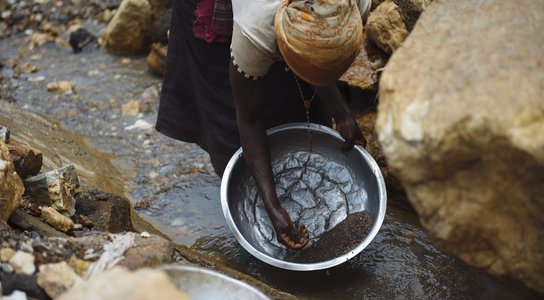You might have read about the use of child labour in Ghana’s artisanal gold mines. Thousands of children mine Ghanaian gold in hazardous conditions and in violation of Ghanaian and international law, according to a recent Human Rights Watch report. The report found that minors in unlicensed mines “pull gold ore out of shafts, carry and crush loads of ore, and process it with toxic mercury.” International gold refiners based in countries that include South Africa, Switzerland, the United Arab Emirates (UAE) and India use gold from Ghana and may be benefitting from this trade.
Unfortunately what the report describes isn’t exceptional. It’s just one example amongst many others of what can happen to the people who are at the bottom of international mineral supply chains if companies that use and trade these minerals do not have adequate controls in place.
As global decision makers, civil society and the private sector congregate in Paris today for the 3rd Global Forum on Responsible Business Conduct, held by The Organisation for Economic Co-operation and Development (OECD), those most at risk of these abuses should be at the forefront of debate.
International attention to responsible mineral supply chains is growing, but so far has focussed on just a handful of countries. Most prominent amongst these is the Democratic Republic of Congo, where internationally traded minerals have funded conflict and human rights abuses for over a decade. But like the supply chains in which these minerals are found, these risks are not confined by borders. They can arise in any supply chain and for any natural resource, and companies won’t know until they do checks to find out. This issue is not one that can be clumsily assigned to a ‘list’ of ‘problem’ countries or to just one or two minerals
What’s more,
the tools exist for companies to manage their supply chains responsibly. They
have done so for five years.
The OECD’s Guidance—Due Diligence
Guidance for Responsible Supply Chains of Minerals from Conflict-Affected and
High-Risk Areas—was developed to help companies respect human rights, to avoid
contributing to conflict through their mineral sourcing practises, and to
cultivate transparent supply chains and sustainable corporate engagement. It
was designed with the mineral sector, and particularly the issue of ‘conflict
minerals’, in mind. But the five-step framework can be applied to any natural
resource. The framework gives companies the tools to
address any human rights violation in their supply chain, not just those
connected to armed conflict. It can be used to assess risks regarding labour
conditions, including child labour, health risks as well as a broad set of
environmental and social standards.
The question
now is this: how many more scandals have to be unearthed along supply chains
before companies turn words into action and actually start sourcing responsibly?
We know political will is growing: just last week G7 leaders issued
a statement committing
to ‘enhance supply chain transparency and accountability’ and encouraging
‘enterprises active or headquartered in our countries to implement due
diligence procedures regarding their supply chains’. Legislation in
the United States has compelled certain companies to check their supply chains
to ensure that four minerals they use and
trade—including gold—have not funded conflict in central
Africa. The European Parliament has just voted for a European regulation that would make
sure that companies bringing tin, tantalum, tungsten and gold into the EU do so
responsibly, in line with the OECD Guidance.
But this international
architecture will always be insufficient unless companies implement it.
The OECD Due
Diligence Guidance can, and should, be put into practise by companies sourcing
gold from those specific mines in Ghana—and other places like them. A recent report
by a UN Panel of Experts estimates
that two tonnes of gold are smuggled out of the Central African Republic every
year, and violent armed groups are known to take a cut from this trade.
Risk-based
due diligence isn’t new—it’s a well-established and widespread practice used elsewhere, for
example in the financial sector. Checking your supply chain isn’t a trade
restriction or a trade embargo: it’s a process whereby risk is identified and
managed, not ignored or avoided. Disengaging entirely from regions or countries
is neither responsible, nor a requirement of due diligence.
The Human Rights Watch report makes it clear that many of the local and international companies that use and trade Ghana’s gold are not doing enough to source responsibly from the country’s artisanal gold mines. As one child who mines for gold in Upper Denkyira East Municipal district put it: ‘I don’t like [working in the gold mine] anymore because of the way people are dying.’ Companies should not wait for the next scandal to hit. They have the tools to identify and address risks that come up along their supply chains. Now is the time to use them.

